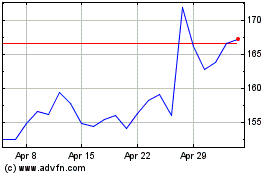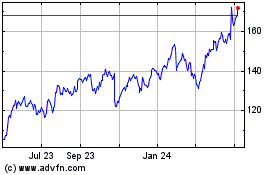Marketers and Ad Agencies Ask Google Not to Kill Cookies Too Soon
January 16 2020 - 3:50PM
Dow Jones News
By Nat Ives
Marketers and advertising agencies expressed alarm over Google's
plan to phase out support of third-party cookies in its Chrome
internet browser.
Google's decision could hurt digital businesses, consumers and
innovation, the Association of National Advertisers and the 4A's, a
trade group for ad agencies, said in a statement.
"It would threaten to substantially disrupt much of the
infrastructure of today's Internet without providing any viable
alternative, and it may choke off the economic oxygen from
advertising that startups and emerging companies need to survive,"
they said.
The groups urged Google not to make any changes until
alternatives are in place.
Cookies are a way to gather information on internet activity.
Websites use first-party cookies to collect data on their own
visitors. Third-party cookies, in contrast, track consumers'
activity across the internet. They generate information that is
useful for ad targeting and other purposes, but have raised privacy
concerns over the years.
Google, part of Alphabet Inc., said in a blog post Tuesday it
intends to phase out support for third-party cookies in its browser
within the next two years.
In response to the trade groups' objections, a Google
spokeswoman emphasized a section of the blog post that said the
company's plan will take effect after the industry develops new
ways to meet advertisers' needs.
Dan Jaffe, group executive vice president at the Association of
National Advertisers, said the trade groups' concerns were
justified because many organizations haven't felt adequately
involved in Google's process.
"Thus, we are urging Google to build a collaborative
industry-wide process that involves all stakeholders, while
committing to protect the current architecture for digital
advertising until the industry develops and implements a viable
alternative," Mr. Jaffe said in a statement.
More privacy and accountability is the right direction, but ads
underwrite many free services online that people don't want to pay
for or can't afford, said Jordan Mitchell, senior vice president at
the IAB Tech Lab, a consortium focused on promoting common
technology and standards for digital advertising.
"The hard part is phasing out third-party cookies without
unintentionally creating a worse situation," Mr. Mitchell said in
an email.
Google's promised shift was inevitable given rising privacy
concerns, said an executive at one digital ad agency. "It's just an
industry trend and a larger movement that I think Google is taking
a very measured approach to," said Justin Scarborough, programmatic
media director at PMG Worldwide LLC.
Apple Inc.'s Safari and Mozilla Corp.'s Firefox already have
rolled out restrictions on tracking cookies. But Chrome dominates
the global desktop browser market.
Ending third-party cookies could counterintuitively improve the
effectiveness of digital advertising because it will push companies
to establish direct, consensual relationships with consumers, Mr.
Scarborough said. "When consumers and companies choose to have
those kinds of interactions, they're doing it because there's a
value exchange, " he said.
"There's a give and a take there," Mr. Scarborough added. "At
the end of the day, the consumer-brand value exchange has to be
brought out of the shadows."
Write to Nat Ives at nat.ives@wsj.com
(END) Dow Jones Newswires
January 16, 2020 15:35 ET (20:35 GMT)
Copyright (c) 2020 Dow Jones & Company, Inc.
Alphabet (NASDAQ:GOOGL)
Historical Stock Chart
From Mar 2024 to Apr 2024

Alphabet (NASDAQ:GOOGL)
Historical Stock Chart
From Apr 2023 to Apr 2024
